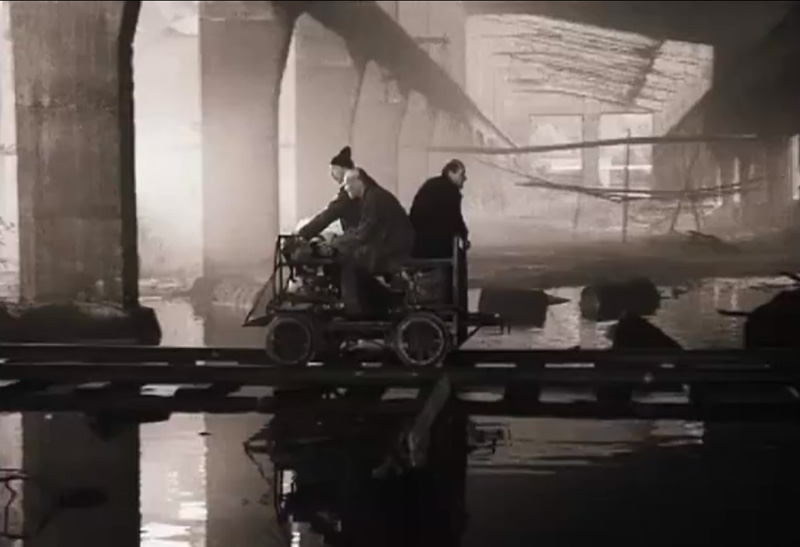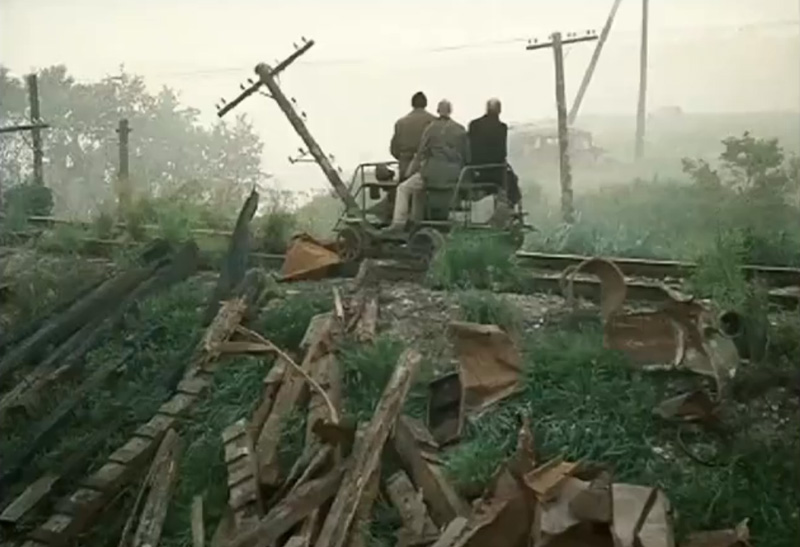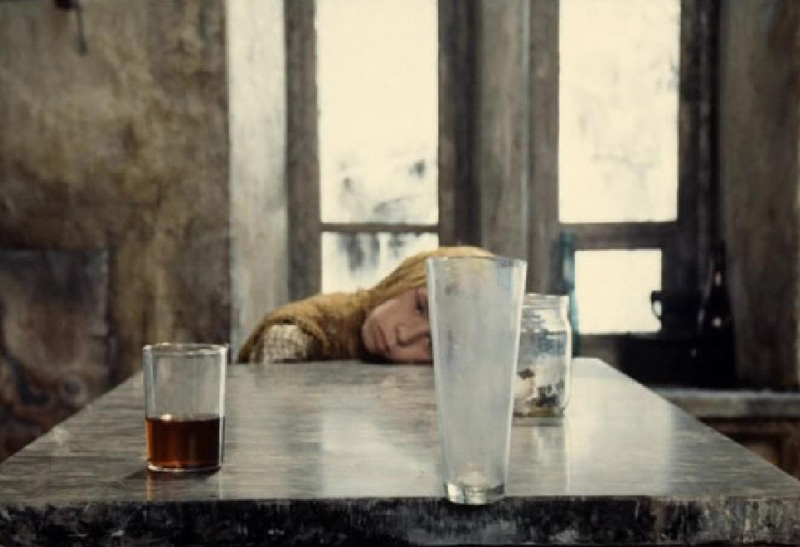The purpose of these weekly blog assignments is to raise the bar of my cultural consumption. When I was in my twenties, I listened to John Zorn and read John Ashbery. But I got lazy after drinking the midlife cocktail of career and kids. I might have a dozen foreign documentaries in my Nexflix cue, but when the kids finally get to sleep, all I want is to do is take a bath in Breaking Bad.
I thought a lot about the different roles that culture plays in one’s lifetime while watching Andrei Tarkovsky’s 1979 film, Stalker, and reading Geoff Dyer’s recent book-length homage to the film, Zona. Dyer first saw Stalker in his twenties and it has haunted him ever since. Midway through the book, Dyer discusses the role of age in his response to the film:
The prominent place occupied in my consciousness by Stalker is almost certainly bound up with the fact that I saw it at a particular time in my life. I suspect it is rare for anyone to see their – what they consider to be the – greatest film after the age of thirty. After forty it’s extremely unlikely. After fifty, impossible.
The most important film in my life was Kings of the Road (Im Lauf der Zeit) by Wim Wenders. Like Stalker, it is a late-70’s art house film that challenges viewers with a slow pace and nearly three-hour running time. In the case of both films, the way this time is experienced is largely what makes it potentially life-altering. But excluding the benefits of a good nap, can one’s life be altered significantly by a film after the age of forty?
It turns out I was thoroughly engaged by Stalker. Like Kings of the Road, it is something of a road movie. Three men take a forbidden journey into “the zone” in search for “the room” where all of one’s wishes are realized. While there isn’t much of a story, there is suspense. Will they safely find the room? What will happen when they get there?
What I enjoyed most about Stalker was the amount of time I had to consider these questions (and many others) during the course of the film. A traditional thriller is often described as a roller coaster ride. In Stalker, the peaks and valleys have been flattened and the viewer has time to look out at the landscape and consider the meaning of the journey. This is literally the case in a railroad scene that Dyer names “one of the great sequences in the history of cinema.”
While putting this post together, I looked up the YouTube clip of this scene. It is fascinating to see how utterly stripped of meaning it is when viewed as a three-minute excerpt on the web. “Stalker is a literal journey that is also a journey into cinematic space and – in tandem – into time,” writes Dyer. So to experience this scene outside of that space is to not experience it at all. I’m reminded of the way I watched The Tree of Life on an airplane monitor over the course of two transatlantic flights.
Here is a quote by Tarkovsky and Dyer’s response:
‘If the regular length of a shot is increased, one becomes bored, but if you keep on making it longer, it piques your interest, and if you make it even longer, a new quality emerges, a special intensity of attention.’ This is Tarkovsky’s aesthetic in a nutshell. At first there is a friction between our experience of time and Tarkovsky-time and this friction is increasing in the twenty-first century as we move further and further away from Tarkovsky-time towards moron-time in which nothing can last – and no one can concentrate on anything – for longer than about two seconds.
The great pleasure of watching Stalker was to finally have an escape from moron-time. But was my life changed? Can such a thing even happen to someone in his forties? The more I think about Stalker, the more this seems to be the very subject of the film. The three characters in Stalker are all middle-aged and world-weary. All are coming to the Zone in hopes of changing the course of their lives. At the end of the jouney/film, all three men return to the bar where they started. While they have all experienced something monumental, none appears fundamentally changed. Only the one child in the film seems capable of channeling the room’s magical forces.
I loved Stalker. But it couldn’t quite take me to the same transformative place that Kings of the Road did. Perhaps that kind of epic transformation is reserved for the young.




Well I’m glad you wrote this. I watched this film during my BA photog studies in 2012 and it had a profound effect on me http://scottklang.com/section/331147_7.html…As I was studying and had the Uni library at my disposal, it gave me the opportunity to research Tarkovsky and this was a joyful experience. Sculpting in Time is something we do as photographers, at least that’s what i began to feel. Stephen Gill edited this book http://www.brightbrightday.com/ that you may be aware of. I think the transformative change for the older person is equally powerful, but when thinking of the body as a carrier of experience, a vessel if you will, longer life means larger vessel, a large vessel ie ship takes longer to turn around, but……well I’m sure you catch my drift! I also saw Kings of The Road in my twenties Wings of Desire resonated with me on a deeper level though. Thanks for sharing admin.
Thanks for reminding me of Bright Bright Day. Alas, I only have Instant Light – an inferior book.
Wings of Desire also had an enormous effect on me. I saw it alone in Manhattan in college. I remember walking out of the theater and thinking that the whole city looked and sounded different.
Bright Bright Day is like rocking horse shit. I wish I’d have bought it when it was released. Story of my life! Great blog.
alex
thank you for a great post
the first tarkovsky movie i saw was at the University Film Society on the west
bank. it was in the early 80’s.
Al Milgrom the founder of the society had a copy of Andrei Rublev which had
been smuggled out of russian as there was a ban on his films at the time.
Milgrom introduces the film this way “this film is in 3 reels, we are not sure what
order they play in as the film is very surreal.” the film was fantastic in
what ever order and tarkovsky is still my favorite director. looking forward to reading the book. cheers mark
It’s funny you saw this recently. Bloggers have been convinced you already dig this movie:
http://bolus.tumblr.com/post/18600035545/im-rewatching-andrei-tarkovskys-stalker-1979
And your blue-eyed, pink-haired girl with her head resting on a table has always reminded me of the telekinetic girl at the end of Stalker.
Anyway, Tarkovsky can do no wrong. In some ways, I think his movies function like smart photo books in how they unfold.
Thanks for this post.
Hi
A Swedish director/genius that have taken the concept of slow cinema very far is Roy Andersson. You should really see his brilliant “Songs from the Second Floor” or “You the Living”.
Cheers
/h
The Swedish Roy Andersson DVDs (Region 2) have got English subtitles. Look for “Sånger från andra våningen” and “Du, levande” on Amazon, discshop.se or cdon.com if you can not find the English titles. And buy the DVDs so that you get the behind-the-scenes as well. It’s quite amazing how he makes his films. So don’t google to much about Roy before you see the films ;-)
Best /h
I saw Stalker 2 years ago. I was 38. It helped make my 40’s, thus far, a great age. An unbelievable film. Dyer definitely defined Tarkovsky’s “aesthetic in a nutshell.” I don’t ever recall feeling obliged to confront a television screen for 3 straight hours prior to seeing Stalker, with the exception of Scarface, maybe Wenders “Wings of Desire”, and sadly back-to-back episodes of Dukes of Hazard during my pre-pubescent days marveling over Daisy’s Dukes. “Moron time” is dangerous stuff. I’d chant “Kill your television” if it weren’t for great cinema like Stalker that comes around only perhaps a dozen times in one’s lifetime. Thanks for the heads up to “Kings of the Road.”
On Saturday night after the Magnum Symposium in Austin, a bunch of us took a bus out to a BBQ place in the countryside (The Salt Lick). Joseph Koudelka sat next to me and we ended up talking about Tarkovsky. It makes sense that he’s an fan.
It is important to note that Stalker is loosely based on the science fiction novel “Roadside Picnic” by the Strugatsky brothers. It’s a quick read and will greatly change the way you view Stalker! The film certainly stands on its own, but like “Solaris,” it is heavily indebted to its original source material.
As far as “moron time” goes, I agree to a certain extent, but there is also a hint of “things were so much better when” sort of sentiment going on here. Today’s twenty somethings will pine for the good old days as well at some point in the future, and their “good old days” are happening right now.
‘Stalker’ is truly a great film. But actually I like Tarkovsky’s ‘Mirror’ (Zerkalo) even better. It’s haunting, poetic and surreal. Beautiful music. I think ‘Mirror’ is a bit underrated, standing in the shadow of Tarkovsky’s recognized masterpieces like ‘Stalker’ and ‘Solaris’.
I really like the idea about how important it can be when we see a film – and I think it changes and evolves as we do. Your post about Stalker takes me back to my early twenties when I saw most of Tarkovsky’s films and they had a great impression. There are still images from his films that remain with me to this day (I’ve not watched any of them for a long time). Reflecting again on time and picking up another post here I recall seeing Wings of Desire at a film festival and then some years later again at the time the wall came down – it made me see the film very differently.
Your post highlights how important life stages are and how we interact so differently with things as our life – and experience evolves.
Mr Soth,
You probably know that your collegue Pinkhassov worked with Tarkovsky, if I remember correctly he was the still photographer for Stalker.
A second vote for “Mirror” as an even better film. Best seen in a small arts cinema, ignoring the shuffling and muttering of those who don’t get it and who leave after 20 minutes, ending up blissed-out in a half-empty cinema, with the urge to exchange addresses with everyone else left in the place when the lights go up. Probably also best around 1978 before smoking was banned.
You sat next to Koudelka and discussed Tarkovsky?? Do you ever pinch yourself?
Mike